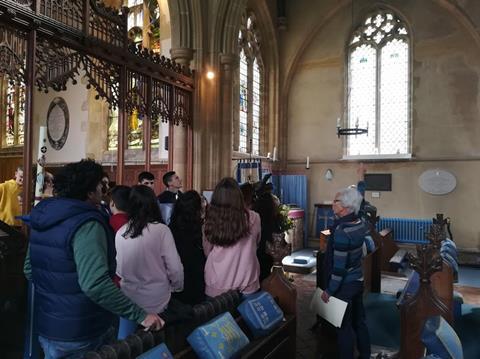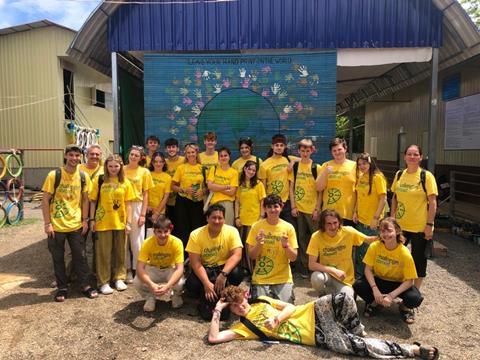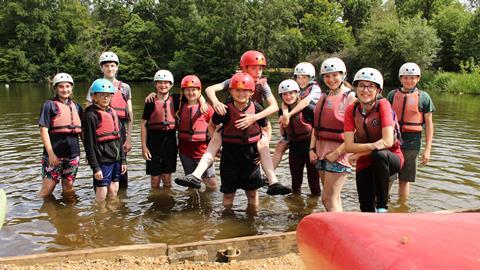We spoke to Dr Jean Wheeler, EVC at Thurston Community College in Suffolk, to hear how she organises educational visits, her most memorable travel experiences and how the school promotes a culture of successful outdoor learning.
What made you want to become a teacher?

I wanted to do research in geology and get a PhD, I liked rocks, mountains and being outdoors. During my time in America completing my master’s degree I taught on the undergraduate programme. Then on returning to England I did my PGCE whilst I tried to secure funding for a PhD. Looking back now, I think subconsciously as soon as I entered the classroom for the first time, I knew teaching was for me; I absolutely loved it.
As a profession, teaching has given to me more than I could ever have given back. I am naturally quite an introvert and teaching has developed the social side of my personality in so many ways. The interactions with staff, students, parents and the public have all served to bring me out of my shell, such that over the years I have become far more confident as a person and enjoy the company of others in all sorts of settings and situations.
You must see a real change in pupils when they’re outside the classroom?
Some students can show a totally different personality when away from school and on a visit, not all but certainly a good number change their behaviour and demeanour in such a positive way. It is lovely to see the longevity of this change when returning to school. Educational visits are so life-changing, we all know that, and I never cease to have that feeling of satisfaction that comes when a visit impacts so noticeably on a student and their peers.
Do you have any memorable experiences of your travels with pupils?
At my previous school, my Year 7 tutor group and I joined at the same time, way back in September 1991. I ended up taking the year group, including most of my tutor group on a residential to the Lake District. The next year we went to Valkenburg, the following year we went to France, and then the final year I was the person who saw them out on work experience.
They are all now in their 30s with children of their own. Out of the 25 from my tutor group, around 22 remain in touch to this day. The experience of taking them on those residential visits definitely cemented that tutor/student relationship. I read comments from those students where they still refer back to what they got up to and the friendships they made on those visits, which I think is absolutely amazing. They all still call me ‘Miss’ whenever I hear from them!
How do you deal with the admin side of putting together educational visits?
As we moved onwards from the implications of Covid, the number of visits increased significantly. It was the perfect opportunity to review, with fresh eyes, our practices and procedures for visits. I have been an EVC for a good number of years now and am very aware of falling into the trap of ‘this is the way we’ve always done it and we’ve not had any issues to date’. I am sure that everyone appreciates how that is not good practice and that review and updates are essential in all aspects of our professional lives, and in particular for me, it was the right time to take a fresh look at educational visits.

In terms of the administration of visits, we have been making use of the EVOLVE system for more than eight years. What has made the use of EVOLVE that much more powerful as a system has been attending the accompanying training offered by EVOLVE Advice. This training has been the best CPD I have ever received in my 30 plus years of teaching; thorough, engaging, responsive to need and relevant to the everyday practices of the college.
What sort of roles do you take on as an educational visits coordinator (EVC)?
My main job as an EVC is to promote educational visits, to support wherever I can and have input, which then helps to ensure visits go ahead. This includes making sure the host venue is documented as being dependable, safe and offering good value for money - the LOtC Quality mark and Kaddi registered are my starting points for such information. I also check all risk assessments associated with a visit, work with the visit leader to ensure it does not run in deficit and advise on staffing and student matters relating to safeguarding. Educational visits are an integral feature of our school’s culture.
“If necessary, depending on that final price, we consider the options of other sources of funding, spreading of payments where that is appropriate to the total sum…”
How do you build that culture so that all members of staff are working towards the same goal?
Everyone knows at Thurston Community College that we do educational visits properly. The way that has become part of our culture is by our staff knowing they can only lead a visit and/or be an assistant leader if they have the full and correct training. I always say to staff that if they haven’t got the time to run a visit properly, don’t run it. Over half of our staff, teachers and support staff, have given up their own time to be trained. That is how the culture of how and why we do visits has been established.
How do you make the most of learning outside the classroom at the school?
To ensure all students take part in learning outside of the classroom itself, we offer several opportunities for local area visits; exploring the area close to the school. This ensures those students who tend not to take part in sports fixtures, day or residential visits do take part.

For example, our students have walked to the local church for a talk, with tea and cake included, then they walked on to a local retired blacksmith to watch him at work before heading off to our separate Sixth Form campus for dinner. They then walked back to our main school campus. They enjoyed their visit, but more than anything, they enjoyed being off site and it was a pleasure hearing from the visit leader as to how the relationships across the group had been developing alongside the personal skills of the individuals.
How do you make educational visits accessible for all students in terms of funding?
Once a teacher has come to me with a visit idea, we sit down together and work out the costings. That generates an overall price per student. If necessary, depending on that final price, we consider the options of other sources of funding, spreading of payments where that is appropriate to the total sum, and critically by providing in our letter to parents and carers the name of the person to contact for any concerns or questions that might arise. We will always work with the parents and carers to do whatever is reasonable and achievable to ensure each student can take part in the visits which go from our school.











